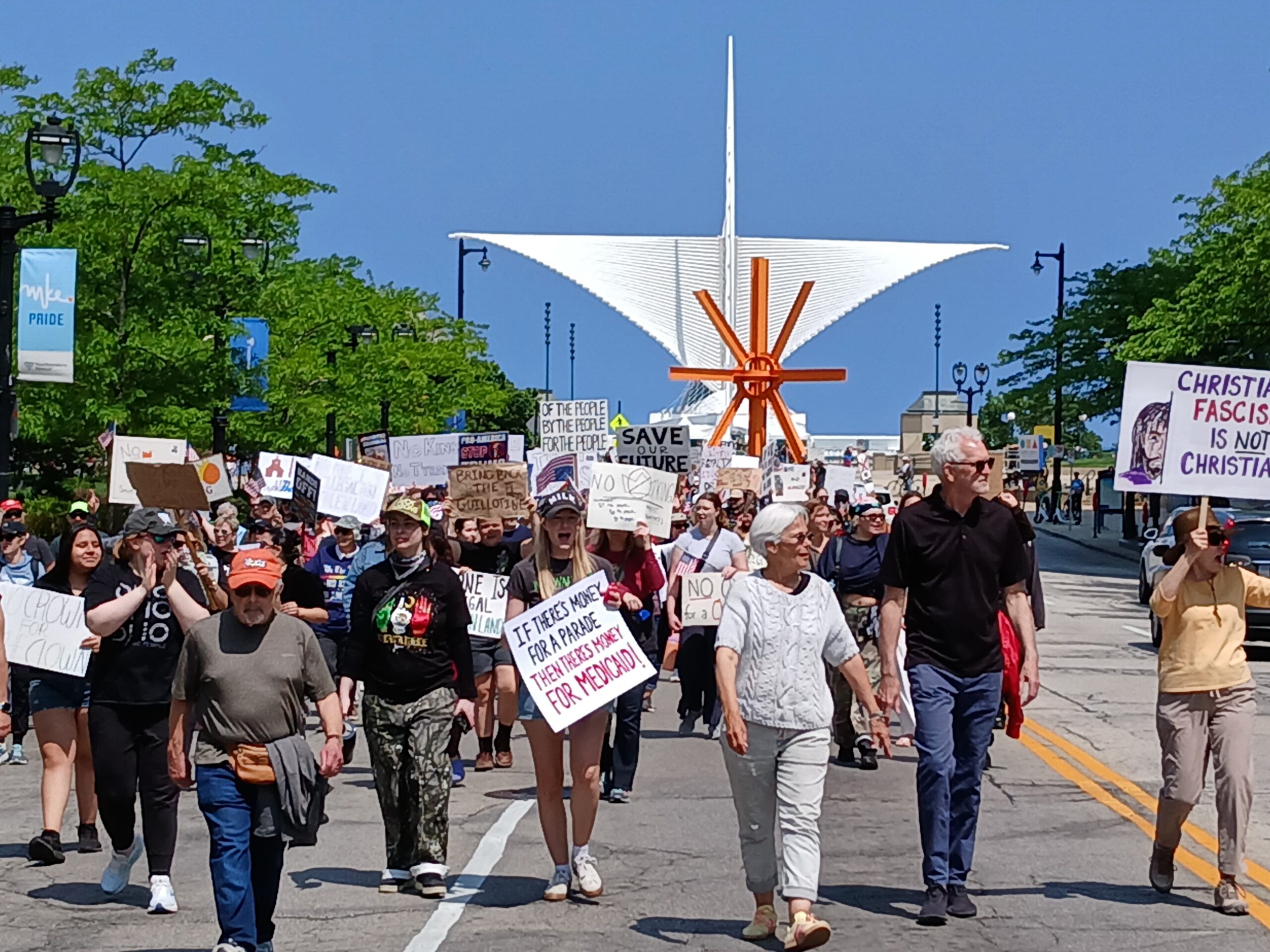
Cathedral Square Park is jammed with an estimated 10,000 “No Kings” protesters Saturday. Photo by Mike DeSisti Milwaukee Journal Sentinel.
The clash of resounding, angry coast-to-coast public sentiment against self-satisfied Trumpian tone deafness thundered across real space and time on Saturday, June 14.
Yes, it was the 250th anniversary of the U.S. Military and somebody’s 79th birthday. So the Narcissist-in-Chief got his HUGE military parade – a la Communist China, North Korea and Russia, all groaning, pavement-crushing tanks, roaring overhead jets and marching troops – to pretend it was all in his glorious honor. Many troops reportedly did not want to be there.
“I have never experienced such a joyless, lifeless, and sterile mass event in my life,” commented Esquire‘s longtime political reporter Charles Pierce. Yet Adolf Hitler’s moldy remains probably quivered in envy.
So that was the weird cocoon of Washington, D.C. adorned with its MAGA shell.
What was really happening in America Saturday?
Five million people were amassing across the nation, in “No Kings” protests fully rejecting the way Trump’s agenda is striving to endow him with monarchial, increasingly authoritarian, powers. People are protesting masked ICE agents workplace raids to deport immigrants without due process, and National Guard and Marine actions in Los Angeles, the arresting of a U.S. Senator at a press conference, the ongoing travesty of American governmental support of Israel’s self-defense-turned-genocide of Palestine’s Gaza, among a myriad of other problems with our deeply injured democracy right now.

As the Milwaukee Journal-Sentinel reported, Wisconsinites in more than 50 towns and cities took to the streets on Saturday, June 14, as part of what organizers say was the largest nationwide protest yet against President Donald Trump’s second-term agenda, the stuff of tyranny running amok.
In downtown Milwaukee, organizers estimated the crowd reached almost 10,000 people, according to Alan Chavoya, a protester with the Milwaukee Alliance Against Racist and Political Repression. Protestors chanted and sang in Cathedral Square Park, before marching a mile loop around part of downtown. The rally was energetic, but peaceful.
I was there and can affirm that description.
The protest’s first phase was a series of speakers who had plenty to say, some fiery, some incisive and learned, and speakers ran much longer than the planned one hour time slot. But these times are bristling with burning issues to discuss and protest from the Trump agenda, defying the law, a compliant Congress and the Courts, with immigrant issues at the top of the list.
The crowd remained attentive and patient. There were a number of quote-worthy speeches and notably one speaker who offered the shocking news that Minnesota state Rep. Melissa Hortman and her husband, Mark, were shot and killed, a short time beforehand. Also, Minnesota state Sen. John Hoffman and his wife, Yvette, were shot multiple times in the early morning hours Saturday. The anouncement prompted the crowd to a moment of silence to honor that tragedy. (Vance Boelter was arrested Sunday night in rural Sibley County, about 50 miles from Minneapolis, as the prime suspect in what has been described as a politically motivate assassination.)

However, I took no notes Saturday so I’ll let one speech suffice by example. Renowned progressive journalist and author John Nichols delivered a double-whammy of a special sort. He first declared that he actually had a distant ancestor who took part in the American Revolution. But then he quickly clarified the role of dissent in our history of patriotism by noting that only white men could vote when the nation was formed. Suffrage for women and voting rights for people of color came much, much later, a long, achingly profound history we must never forget.
As another speaker said, quoting the great Black abolitionist Federick Douglass, “If there is no struggle, the is no progress.”
Then at one point, Nichols paused and said, “I just had a call from a friend of mine.” It seemed a curious disruption of the momentum of his speech. But in a few moments we understood what this meant. After a click or two, a voice came over the loudspeaker — the unmistakably Brooklyn-tinged accent of Senator Bernie Sanders. No figure but the voice was doubtless. It was a bit of old-fashioned sleight-of-hand stagecraft, updated for the cell-phone era.
Sanders gave us about five minutes of his vintage stem-winding rhetoric about billionaires screwing the countless of the 99 per cent. He also pointed out how the recent Wisconsin election of liberal Supreme Court justice Susan Crawford provided powerful repudiation of Trump and his then-right-hand billionaire Elon Musk who had contributed millions to defeating Crawford (before bowing out of his despicable position). It was just the sort of thing this crowd deserved to hear, I daresay. Nichols actually co-authored a book with Sanders published last year, It’s OK to be Angry About Capitalism, striving to reground the left’s arguments in the new populism.
After years of political prominence Sanders may be right now — along with Alexandria Ocasio-Cortez — the two most electrifying figures on the left side of democratic politics, by virtue of their recent “Fighting Oligarchy” nationwide tour, which has continually commanded large crowds. The pair is all the more striking for representing political figures widely separated generationally, yet brought together in resounding harmony of defiance.
Nichols, a Wisconsin native and Madison resident, closed his speech by telling us we cannot go backward into the nostalgic fictional past of the white supremacist MAGA movement. “We are Wisconsinites and Wisconsinites go forward!” he shouted, invoking the state’s motto, ever pointed to righteousness.



Your blogger, Kevernacular, at the Milwaukee “No Kings” protest with his well-traveled Trump sign, modified with a “king” crown motif. Photo by Nancy Lynch


 If a political novice like Donald Trump can become president
If a political novice like Donald Trump can become president